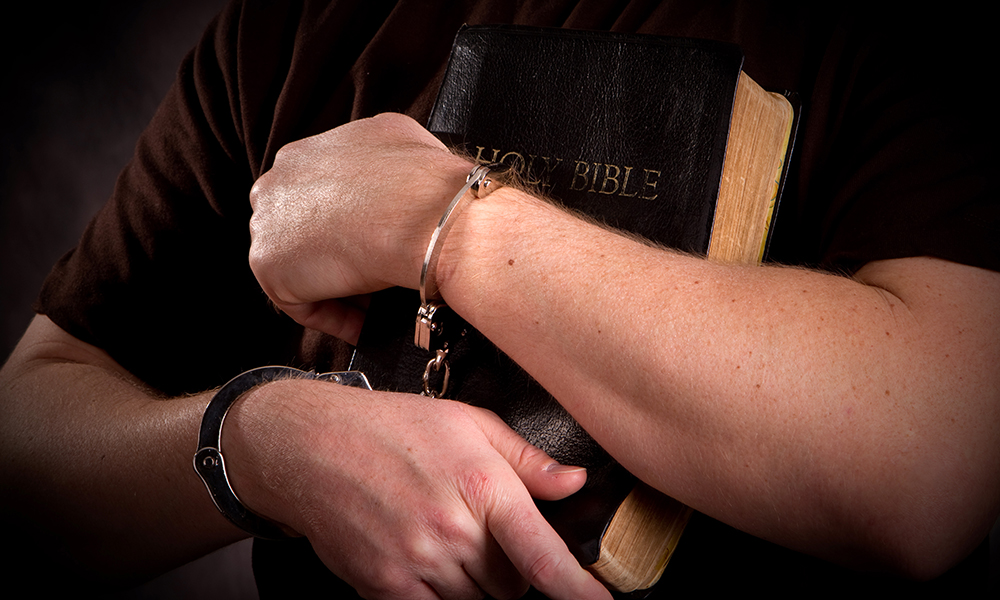In my diocese, a thriving prison ministry flourishes, led by the generous service of our permanent deacons, with the assistance of priests and many committed laity. Individual pastoral visits, Bible study, regular Masses and confession, an RCIA process and retreats contribute to an extraordinary pastoral care unfolding for the benefit of our incarcerated brothers and sisters. I am deeply grateful for the Christians witness of so many dedicated servants of the Lord.
A great blessing for me has been the opportunity to visit the prisons, celebrating the Eucharist and Confirmation, helping with the annual retreat, doing some of the RCIA scrutinies and meeting with the men on death row. In Matthew 25, Jesus tells us that, when we visit someone in prison, we are encountering him. I have stood in the “pit,” still existent underneath Caiphas’ house in Jerusalem, the dark hole where Jesus spent in prison the last night of his earthly life, facing a horrible execution the following day. Christ spent time on death row.
Whenever I converse with prisoners, at least those involved in Church activities, I encounter faith, love and hope. Many of the men struggle to accept God’s forgiveness for what they have done and to forgive themselves. Like all of us, they try to believe, pray and keep on the path of discipleship. I consistently remind them that they are sons of the Father, beloved by Jesus Christ; their criminal and violent deeds do not fully define them as human beings. They are so much more than that. Many of them have spent decades behind bars; many will never leave.
At any given moment, counting Federal and state prisons, as well as local jails, over 2 million people are incarcerated in the United States, and the number steadily increases. Our country locks up more people per capita than any other nation on earth. Many prisoners are a threat to others and need to be behind bars; those guilty of serious crimes have a debt to pay society. Few would disagree that part of an effective justice system is fair sentencing for crimes committed.
My experiences of prison ministry in Wisconsin, the Dominican Republic and now here in Indiana, however, raise questions in my heart and mind. Should prisons be simply punitive or also rehabilitative? Should we simply punish people indefinitely, or can they possibly change for the better? So many formative programs, educational opportunities and humanizing details have disappeared from contemporary American prisons that many inmates are more dehumanized, angry, disconnected and incapable of embracing a peaceful, productive and lawful life out in society. Are we simply warehousing people, or do we have a responsibility to help those in prison to experience transformation and conversion?
Capital punishment is clearly a controversial issue because it, too, raises many questions. In the 21st century, is it truly moral to execute a criminal who can be securely contained from society? We certainly need to fully acknowledge the horrific and violent crimes that many on death row have committed, but is putting them to death really the solution? Evidence suggests that capital punishment does not effectively serve as a deterrent to murderous violence. It costs the state more to execute someone than to incarcerate them for life, because of all of the judicial appeals. Cases exist where DNA testing proved that some death row inmates were actually innocent. Can an act of violence truly heal another act of violence? Many of the men on death row have experienced repentance for their crimes and an authentic conversion. Their time in prison has allowed them to reach such a point of grace.
Some voices iterate that the death penalty is justified, that some murderers have committed such heinous and horrible deeds that they should be put to death. Loved ones of such murder victims sometimes call for the execution of the one who killed their child, spouse or sibling. We can certainly empathize with the horrible trauma inflicted when someone close is brutally murdered; a natural human response is the desire to see such a killer’s life taken away as well. But, doesn’t Christ call us to go beyond “a life for a life?” Peace can only come with reconciliation and forgiveness.
Clearly, some criminals must be incarcerated their entire lives because they pose a threat to society, but is it not time to do away with the death penalty, to seek rehabilitation and healing for prisoners where possible, to put more resources into a concerted effort to help released inmates to live productively, contributing to the common good and finding their place in society? I readily acknowledge that issues related to the justice system, criminality, and prisons are complex and difficult. Nevertheless, the Church will always speak out for the life and dignity of every human being, unborn and born, immigrant and native, wealthy and poor, incarcerated and free. The social vision of Catholicism imagines a society of respect for all life, solidarity with the marginalized, mercy and justice for the poor and a healthy concern for the fully integrated flourishing of the human person. As Catholic disciples of the Lord Jesus, we can never give up our efforts to build a civilization of life and love, ready for the fullness of the Kingdom of God.
Bishop Hying is the bishop of the Diocese of Madison, Wisconsin.

